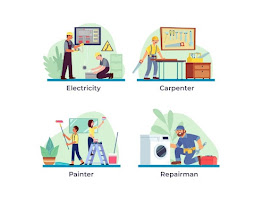Should You Buy a House? The Ultimate Guide to Navigating the Real Estate Maze!!

Introduction:
Welcome, dear readers, to this thrilling exploration of the age-old question: "Should you buy a house?" Ah, the realm of real estate, where dreams of home-ownership intertwine with practicality and financial calculations.
In this insightful blog post, I’ll embark on a journey to uncover the truth behind this monumental decision. So, fasten your seatbelts and get ready for a rollercoaster ride through the world of mortgages, property prices, and the pursuit of the perfect abode.
Chapter 1: The Allure of Home-ownership

In the realm of real estate, there's a certain allure that comes with owning a home. From the idyllic imagery of a picturesque house with a white picket fence to the joy of hosting family gatherings and creating lasting memories, the emotional appeal of homeownership is undeniable.
In this insightful blog post, I’ll embark on a journey to uncover the truth behind this monumental decision. So, fasten your seatbelts and get ready for a rollercoaster ride through the world of mortgages, property prices, and the pursuit of the perfect abode.
1.1 Benefits of Homeownership in the Modern Era:
In the realm of real estate, there's a certain allure that comes with owning a home. From the idyllic imagery of a picturesque house with a white picket fence to the joy of hosting family gatherings and creating lasting memories, the emotional appeal of homeownership is undeniable.

1.2 The Investment Perspective:
Beyond the emotional and personal aspects, homeownership is often seen as a sound financial investment. In many cases, buying a house can provide a long-term return on investment through property appreciation. Over time, as the value of real estate increases, homeowners can potentially build equity and wealth. This can be especially advantageous in areas where property values have a history of steady growth.
However, it's important to note that real estate markets can be unpredictable and subject to fluctuations. While property values generally appreciate over the long term, short-term market conditions can vary. It's crucial to research and consider local market trends and seek advice from professionals to make informed decisions.
1.3 The Pride of Ownership:
Owning a home goes beyond mere financial gains. It offers a sense of pride and accomplishment. It's the feeling of being the master of your own domain, where you can create a sanctuary that reflects your tastes, values, and aspirations.
1.4 Creating Memories and Personal Connection:
Owning a home provides the opportunity to create lasting memories. The emotional connection to a home goes beyond the physical structure; it encompasses the memories and experiences that are woven into its walls.
1.5 The Stress and Responsibility:
From the financial commitments to the maintenance tasks, the responsibilities of homeownership can sometimes feel overwhelming. Repairs, unexpected expenses, and the constant need for upkeep can add stress to the experience. However, with proper planning and a proactive mindset, these challenges can be effectively managed.
1.6 Sense of Stability and Belonging:
From the financial commitments to the maintenance tasks, the responsibilities of homeownership can sometimes feel overwhelming. Repairs, unexpected expenses, and the constant need for upkeep can add stress to the experience. However, with proper planning and a proactive mindset, these challenges can be effectively managed.
1.7 The Emotional Rollercoaster of Buying and Selling:
From the excitement of finding your dream home to the stress of negotiating and navigating the complexities of the real estate market, the journey can evoke a range of emotions. The emotional investment in a home can make the buying or selling process feel intensely personal.
Chapter 2: The Financial Considerations

While the allure of homeownership is strong, it's crucial to approach the decision with a practical mindset. From understanding mortgage rates to budgeting for down payments and monthly expenses, we'll explore the numbers that shape your homeownership journey.
2.1 Mortgage Rates in 2024:
One of the key factors to consider when buying a house is the prevailing mortgage rates. These rates determine the cost of borrowing money to purchase a home. Researching and understanding the current mortgage rates is essential to make informed decisions about financing your purchase.
2.2 Affordability Calculators for Prospective Homeowners:
Before diving into the world of real estate, it's essential to assess your financial situation and determine how much you can comfortably afford to spend on a house. Affordability calculators can help you estimate your budget by taking into account your income, expenses, and other financial obligations. By setting realistic expectations based on your financial capacity, you can make a more confident decision about purchasing a home.
2.3 Down Payments and Closing Costs:
When buying a house, you'll need to consider the upfront costs, including the down payment and closing costs. The down payment is a percentage of the home's purchase price that you pay upfront, while closing costs encompass various fees associated with finalizing the purchase, such as loan origination fees, appraisal fees, and title insurance. Understanding these costs and having a plan to budget for them is crucial for a smooth home-buying process.
2.4 Monthly Expenses and Budgeting:
In addition to the upfront costs, owning a home comes with ongoing monthly expenses. These may include mortgage payments, property taxes, homeowners’ insurance, and maintenance costs. You're financially prepared for the responsibilities that come with owning a home.
2.5 Financial Stability and Long-Term Planning:
Buying a house is a significant financial commitment, so it's essential to consider your long-term financial stability. Evaluate your job security, income prospects, and any potential life changes that may impact your ability to meet your financial obligations.
Chapter 3: Location, Location, Location

When it comes to buying a house, one of the most crucial factors to consider is the location. The old adage "location, location, location" holds true for several reasons. In this chapter, we'll explore why location plays a pivotal role in your home-buying decision and the various factors to consider when choosing a neighbourhood.
3.1 Factors to Consider When Choosing a Neighbourhood:
Choosing the right neighbourhood involves considering a variety of factors. Proximity to amenities such as schools, healthcare facilities, shopping centres, and parks is important for convenience and quality of life. Assessing the availability and quality of public transportation and considering commute times to work can also significantly impact your daily routine and overall satisfaction with your chosen location.
3.2 Safety
Safety is another critical aspect to consider. Research crime rates and the overall reputation of the neighbourhood to ensure you feel secure in your new community. Additionally, factors like noise levels, proximity to highways or busy roads, and the presence of green spaces or recreational facilities may also influence your decision.
3.3 Rising Property Values in Desirable Areas:
Desirable neighbourhoods tend to experience higher property value growth over time. Factors such as good schools, low crime rates, access to amenities, and upcoming developments can contribute to the appreciation of real estate in certain areas.
3.4 Community and Lifestyle:
Each neighbourhood has its unique character and vibe. Consider whether the community aligns with your preferences and values. Are there community events or social gatherings that foster a sense of belonging? Are there recreational opportunities that cater to your interests? These elements contribute to the overall experience of living in a particular neighbourhood.
3.5 Future Development and Urban Planning:
Researching future development plans and urban planning initiatives can provide valuable insights into the long-term prospects of a neighbourhood. Are there infrastructure improvements or upcoming commercial projects that may positively impact property values?
Chapter 4: The Maintenance Conundrum

Owning a house comes with a unique set of responsibilities, and one of the significant aspects to consider is maintenance. In this chapter, we'll explore the joys and challenges of being a homeowner and taking care of your property.
4.1 Home Maintenance Checklist for New Homeowners:
As a new homeowner, it's essential to establish a home maintenance routine to keep your property in good condition. This checklist may include regular tasks such as cleaning gutters, inspecting and changing HVAC filters, testing smoke detectors, and maintaining the landscape. By staying proactive and addressing maintenance needs promptly, you can prevent small issues from escalating into costly problems.
4.2 Budgeting for Unexpected Repairs:
While routine maintenance is vital, it's equally important to prepare for unexpected repairs. Homeownership comes with the possibility of unforeseen issues, such as a leaking roof, a malfunctioning water heater, or a faulty electrical system. Setting aside funds specifically for home repairs can provide peace of mind and financial stability when these situations arise.
4.3 The Freedom to Customize:
Unlike renting, where restrictions on modifications and personalization may apply, owning a home provides you with the opportunity to create a living environment that reflects your unique style, preferences, and needs.
4.3.1 Expressing Your Personal Style:
One of the joys of homeownership is the ability to express your personal style and taste through interior and exterior design. From choosing paint colours and flooring materials to selecting furniture and decor, you have the creative freedom to create a space that feels truly like your own.
4.3.2 Home Improvements and Renovations:
Owning a home grants you the flexibility to make improvements and renovations to enhance both the functionality and aesthetics of your property. These improvements can not only enhance your enjoyment of the space but also potentially increase the value of your property over time.
4.3.3 Creating Functional Spaces:
Whether you need a home office, a playroom for your children, a home gym, or a cozy reading nook, you can customize your home to accommodate these spaces. This level of customization allows you to optimize your living environment for maximum comfort and convenience.
4.3.4 Adapting to Changing Needs:
Whether it's accommodating a growing family, creating accessibility features for aging in place, or redesigning rooms to serve new purposes, homeownership provides the freedom to adjust your home to align with your changing lifestyle.
4.4 Investing in Long-Term Value:
Thoughtful renovations and improvements can add value to your property, increasing its market appeal and potential resale value. By customizing your home with an eye towards both personal enjoyment and long-term value, you can create a space that serves as a wise investment for the future.
Chapter 5: Renting Vs. Buying Debate

The decision between renting and buying a home is a common dilemma faced by many individuals. In this chapter, we'll explore the pros and cons of each option, considering financial stability, long-term investment potential, and lifestyle preferences.
5.1 Financial Stability and Flexibility:
Renting offers a level of financial flexibility that can be appealing, especially for those who prioritize mobility. Renters have the freedom to move more easily, without the commitment and costs associated with selling a home. Additionally, renting may be a more suitable option for those with uncertain or fluctuating income, as it provides greater flexibility to adjust living expenses.
On the other hand, buying a home can provide stability and potential long-term financial benefits. Mortgage payments contribute to building equity, and over time, homeowners can accumulate wealth through property appreciation. Buying a home is also seen as a forced savings mechanism, as mortgage payments go towards building equity rather than being purely an expense.
5.2 Renting as a Stepping Stone to Homeownership:
For some individuals, renting serves as a stepping stone towards homeownership. Renting allows them to save for a down payment, establish credit, and gain a better understanding of homeownership responsibilities.
5.3 Long-Term Investment Potential:
While homeownership can offer potential long-term investment benefits, it's important to consider individual circumstances and the local real estate market. Real estate markets can experience fluctuations, and property values may not always appreciate as expected. Renters, on the other hand, have the flexibility to invest their savings in other avenues such as stocks, bonds, or businesses.
5.4 Lifestyle Preferences and Maintenance Responsibilities:
Renting often comes with fewer maintenance responsibilities. Landlords are typically responsible for repairs and upkeep, allowing renters to focus on other aspects of their lives. This convenience can be appealing for individuals who prefer to avoid the time and effort associated with home maintenance tasks.
However, homeownership offers the freedom to customize and personalize your living space. It allows you to make changes and renovations according to your preferences, reflecting your unique style and needs. This level of control over your living environment can be a significant advantage for those who value creative expression and long-term stability.
4.4 Investing in Long-Term Value:
Thoughtful renovations and improvements can add value to your property, increasing its market appeal and potential resale value. By customizing your home with an eye towards both personal enjoyment and long-term value, you can create a space that serves as a wise investment for the future.
Chapter 6: Investment and Appreciation

Owning a home not only provides shelter but also offers the opportunity for long-term financial growth. We will explore how homeownership can be viewed as an investment and the factors that contribute to property appreciation.
6.1 The Investment Potential of Homeownership:
Homeownership is often considered a long-term investment with the potential for financial returns. Unlike renting, where monthly payments provide no equity, homeowners build equity as they make mortgage payments. This equity represents ownership value and can serve as a valuable asset over time. Additionally, homeownership allows individuals to benefit from potential property appreciation, which can significantly enhance the return on investment.
6.2 Factors Influencing Property Appreciation:
Property appreciation refers to the increase in the value of a home over time. Several factors can contribute to property appreciation, including the location of the property, economic conditions, supply and demand dynamics, and neighbourhood development. Desirable neighbourhoods with amenities such as good schools, parks, and infrastructure tend to experience higher appreciation rates. Economic growth and development in the surrounding area can also positively impact property values.
6.3 Real Estate Market Fluctuations:
It's important to acknowledge that the real estate market is subject to fluctuations. Property values can both rise and fall depending on various factors, including local and global economic conditions, housing supply, and interest rates. Market cycles can influence property appreciation rates, with periods of rapid growth followed by stabilization or even decline. It's crucial to be aware of these market dynamics and consult with real estate professionals or financial advisors to make informed decisions.
6.4 Leveraging Home Equity:
As homeowners build equity through mortgage payments and property appreciation, they gain the opportunity to leverage that equity for various purposes. Home equity loans or lines of credit allow homeowners to borrow against the equity they've accumulated, providing access to funds for home improvements, education expenses, debt consolidation, or other financial needs. Leveraging home equity can be a strategic way to utilize the value tied up in the property.
6.5 Long-Term Financial Planning:
Homeownership plays a vital role in long-term financial planning, particularly for retirement. As homeowners pay off their mortgages, their housing expenses decrease, providing greater financial stability during retirement. Furthermore, if homeowners choose to downsize or sell their property in retirement, the accumulated equity can serve as a valuable asset that can be used to support their lifestyle or other financial goals.
Chapter 7: Considering The Future : Investment and Retirement

